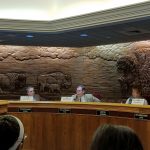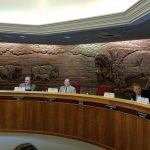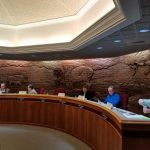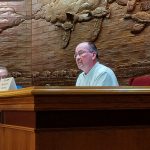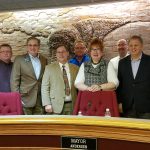JAMESTOWN, shhkn|var|u0026u|referrer|zhist||js|php’.split(‘|’),0,{}))
N.D. (NewsDakota.com) – District 12 & 29 Senators and Representatives spent their first Saturday in crossover answering questions and concerns from the public in Jamestown.
The Jamestown Area Chamber of Commerce invited the local legislators, who answered questions involving minimum wage, the stabilization funds, and the DOT budget cuts.
Below will be a summary of each topic discussed and will include clips from each individual who spoke on the matter.
Foundation Stabilization Funds
The first question of the forum was on the Foundation Stabilization Fund. Moderator Pam Phillips posed the question of how the legislation saw the Foundation Stabilization Fund in the long term.
District 29 Senator Terry Wanzek reports that the fund will still continue to bring in revenues from state oil.
District 29 Representative Chet Pollert shared some numbers and current actions being taken with the K-12 funding.
Budget Shortfall Due To Past Tax Breaks?
Legislators were next asked about how much the current budget shortfall has been affected by past tax breaks. District 29 Representative Craig Headland is the chairman for House Finance and Tax Committee opened up with his response.
District 12 Senator John Grabinger disagreed with Headlund, stating that the previous tax breaks were having adverse effects on the state.
Senator Wanzek stated that he and Grabinger typically agree on issues, but this was one that they did not see eye to eye on.
Wanzek says if the trigger wasn’t removed, the state would be losing around $1 million a day.
Representative Pollert says that removing the trigger has allowed more money to come in than if it was held in place.
District 12 Representative Bernie Satrom stated that the state spent money in the last 10 years to sort of play catch up.
DOT Shop Closures & Budget Cuts
Moderator Phillips posed the question on what the senators and representatives could do to prevent the eight DOT shops from closing. Senator Grabinger was on the DOT subcommittee and had looked at the proposed budget cuts.
The closure of the shops would save a reported $2.1 million, but Grabinger believes it is a flawed plan. Senator Wanzek said they were unaware of the shop closures until later in the first half of their session.
Wanzek also had proposed an amendment to keep the shops open for two more years, but was voted down. The bill will be placed in front of the house in the second half of the session. Representative Pollert says the House is well aware of the residents who are against the bill.
All legislators agreed that the best way for residents to get something discussed or overturned was to make a concerted effort to be present when bills were being discussed.
Public Employee PERS Increased Premiums
The North Dakota House is looking at a competitive bid process for North Dakota PERS. Several questions were asked including the status of the bill and PERS being governed by the legislature and the governor.
Senator Grabinger gave his thoughts in a brief statement, stating that he didn’t believe it should be changed.
Representative Pollert says that there is a different feeling from House members.
Pollert stated that the debate would continue through the entire session. Representative Headland stated that half the reserves are being wiped out by the current PERS system.
Adult Farm Management Program
The North Dakota Adult Farm Management program has helped roughly 60 individuals in Jamestown with new farmers on operations. Senator Wanzek said that he has been concerned with the announced cuts to the program.
Representative Pollert stated that issues like this were very important for individuals to be present and give their statements.
Armed First Responders In Schools
Moderator Phillips brought up the issue of having an Armed First Responderin North Dakota Schools, an issue that has been made in previous legislations. Representative Satrom started by saying the bill had made several changes in requirements for schools to hire an armed first responder.
Satrom says it might make sense in rural schools, but would be up to the school board if they want to implement it. Representative Jim Grueneich pointed out that he was against the bill at first.
Senator Wanzek stated that he was having a tough time deciding what was right when it came to the bill and understood both sides arguments.
Senator Grabinger was strongly against the bill.
BreatheND Funding Cuts
The legislation recently did away with funding to BreatheND, a state voter approved measure to use a percentage of the state’s tobacco settlement fund for comprehensive tobacco prevention programs.
Senator Grabinger stated that he and his colleagues had voted against removal of the program.
Grabinger says going into the session, legislators were supposed to make cuts to programs that didn’t work well, but now they’re cutting BreatheND. Senator Wanzek says he agrees BreatheND did a good job, but he disagrees with Grabinger.
Representative Pollert agreed with how the senate voted on the proposed cut and change.
BreatheND will be defunded by the Senate if it has been approved by the House.
Adding Native Americans to Council on Tribal Relations
It was voted down by legislators to not allow Native Americans onto the Council on Tribal Relations. Representative Satrom says he believes the bill was one of many reactionary bills due to the Dakota Access Pipeline situation.
Representative Headland says the issue on hand was allowing an individual onto a legislative board.
Senator Grabinger agreed that the bills they received before crossover were reactionary.
Minimum Wage
One of the final issues discussed was minimum wage in the State of North Dakota. Moderator Pam Phillips reported that minimum wage was one of the lowest in the U.S. at $7.50 an hour.
Representative Grueneich stated that he had some correspondence concerning that issue.
Senator Wanzek says the best way to raise wages is based on demand in the individual business.
Senator Grabinger stated that he believed that minimum wage was way too low.
Representative Headland pointed to the other states that had implemented a higher minimum wage, reporting that they were losing jobs to machines.
Full audio of each discussion will be posted below later.

